|
|
|
Sort Order |
|
|
|
Items / Page
|
|
|
|
|
|
|
| Srl | Item |
| 1 |
ID:
168595
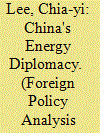

|
|
|
|
|
| Summary/Abstract |
Due to its rapid economic growth and increasing demand for energy, China has engaged in numerous efforts to sustain its energy supplies and enhance its energy security. While existing literature argues that access to energy is oftentimes the driving force behind Beijing's foreign policy behavior, little work has been done to systemically examine the bilateral relationship between China and energy-producing countries. This paper explores how China's foreign policy making is influenced by its energy security concern, focusing on three foreign policy instruments—partnerships, foreign aid, and leadership visits. Using a large-N, quantitative approach, this paper analyzes the effect of oil production on these three foreign policy indicators. The results show that Beijing is more likely to form partnerships with oil-producing countries. Top Chinese leaders are also more likely to travel to countries that produce a higher level of oil. China's aid allocation to Africa is driven by oil abundance as well, although the findings on aid are only valid in the cross-national analysis.
|
|
|
|
|
|
|
|
|
|
|
|
|
|
|
|
| 2 |
ID:
142201
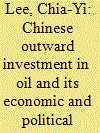

|
|
|
|
|
| Summary/Abstract |
Due to the rising demand for oil, China has been actively investing abroad in oil producing countries. This paper examines the impact of Chinese oil investment, focusing on the economic and political effects in the recipient countries in the developing world. By building on the existing FDI literature, I argue that the presence of Chinese oil investment may be helpful to the recipient countries’ economies but harmful to the quality of governance. The case studies of Sudan and Chad illustrate this dilemma. Using quantitative data on Chinese oil investment and on economic and political development, I find that in countries where Chinese oil investment is present, the economy is growing faster, but the level of corruption is heightened and the level of political accountability is reduced. Western oil investment also has a helpful economic effect, but does not carry a harmful political effect.
|
|
|
|
|
|
|
|
|
|
|
|
|
|
|
|
| 3 |
ID:
121800
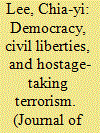

|
|
|
|
|
| Publication |
2013.
|
| Summary/Abstract |
While hostage-taking has been a common form of terrorism for decades, which types of governments are more prone to it remains unclear. Does democracy motivate terrorists to engage in hostage-taking acts because of how easy negotiating with a democratic government is? Or does democracy impose 'audience costs' on the government leaders, driving them never to negotiate with hostage-taking terrorists following the long-held principle of no negotiation? This article argues that hostage-taking terrorists are more inclined to target democratic governments because of the greater value given to human life and personal freedom in democracies. Additionally the helplessness of held hostages is more freely exposed by the media in democracies, which leads to the audience focusing on the hostages themselves rather than on the interests of the nation. This in turns compels decisionmakers to concede, especially near election time. It is only when institutional constraints on the executives are high that democratic leaders refuse to make concessions. Using data on hostage events from 1978 to 2005, this article finds strong evidence that supports this theory, showing that democracy has competing effects on hostage-taking terrorism - civil liberties and press freedom are positively associated with hostage-taking incidents, whereas executive constraints have a negative association.
|
|
|
|
|
|
|
|
|
|
|
|
|
|
|
|
| 4 |
ID:
187558
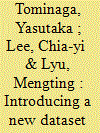

|
|
|
|
|
| Summary/Abstract |
This article introduces a new dataset, Designated Terrorist Organizations (DTO), which details every terrorist organization designated or sanctioned by two IGOs and 148 state governments, as well as the timing of each designation. The DTO includes 281 terrorist groups that have been officially designated by at least one IGO or state government as well as 223 other active terrorist groups that have never been designated. The DTO has a dyadic structure that offers information on both the designating country and the designated group, such as the base location and past activities. We present some trends and patterns of terrorist designation over time and across countries and apply the DTO to analyze the impact of terrorist designation on groups’ attacks. Our preliminary findings show that terrorist designation is negatively associated with terrorist attacks, although the effect only appears in an earlier period.
|
|
|
|
|
|
|
|
|
|
|
|
|
|
|
|
| 5 |
ID:
159857
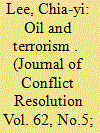

|
|
|
|
|
| Summary/Abstract |
Is there an association between oil and terrorism? If so, how are they linked to each other? While there are literature and anecdotes about oil money financing terrorism, this article identifies three mechanisms through which oil is linked to terrorism: funding, targeting, and motivating. Oil-producing countries are prone to terrorism because they are important targets of terrorists who may attack oil facilities to cause greater impact and to harm powerful countries’ overseas interests and also because oil often generates grievances or greed among local people who may in turn engage in terrorist activities. Using data on terrorist incidents and oil income, this article finds a strong, positive relationship between oil and terrorism. To test the mechanisms, this article uses both large-N and small-N data analyses, and the findings suggest that while all three mechanisms appear to explain the oil–terrorism linkage, the targeting and motivating mechanisms are more likely than the funding mechanism. Oil-producing countries have a higher tendency to sponsor terrorism, but no direct evidence indicates oil money flowing to terrorists except for money from kidnapping or extorting oil workers.
|
|
|
|
|
|
|
|
|
|
|
|
|
|
|
|
| 6 |
ID:
152895
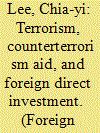

|
|
|
|
|
| Summary/Abstract |
Foreign investors generally refrain from entering countries with high political risks. As an often seen type of political risk, terrorism may deter foreign investors by creating an unsafe investment environment. This paper explores whether terrorism reduces foreign direct investment (FDI) inflows and argues that foreign investors adjust their information by observing whether the host country has the capability to deal with terrorism. Foreign aid from the United States used specifically for counterterrorism is an effective signal of a recipient's counterterrorism potential. Using two commonly used terrorism data sets and drawing upon a time-series cross-sectional data analysis, this paper finds that while terrorism can be an obstacle to FDI inflows, countries that receive more counterterrorism aid are less vulnerable to this adverse effect. It also shows that conflict-tied aid mitigates the negative effect of terrorism on FDI because it sends a similar signal to foreign investors.
|
|
|
|
|
|
|
|
|
|
|
|
|
|
|
|
|
|
|
|
|